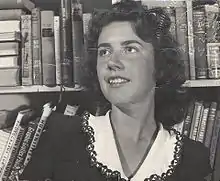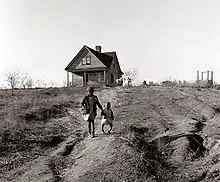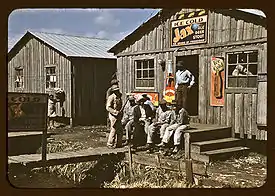Marion Post Wolcott | |
|---|---|
 Wolcott in 1940 | |
| Born | June 7, 1910 Montclair, New Jersey, U.S. |
| Died | November 24, 1990 (aged 80) |
| Occupation | Photographer for the Farm Security Administration |
Marion Post Wolcott (June 7, 1910 – November 24, 1990) was an American photographer who worked for the Farm Security Administration during the Great Depression, documenting poverty, the Jim Crow South, and deprivation.
Early life
Marion Post was born in Montclair, New Jersey on June 7, 1910, to Marion (née Hoyt; known as "Nan") and Walter Post, a physician.[1][2] She grew up in the family home in Bloomfield, the younger of two daughters in the Post family.[3] Her parents divorced when she was thirteen and she was sent to boarding school, spending time at home with her mother in Greenwich Village when not at school.[4] Here she met many artists and musicians and became interested in dance. She studied at The New School.
Post trained as a teacher, and went to work in a small town in Massachusetts. Here she saw the reality of the Depression and the problems of the poor. When the school closed she went to Europe to study with her sister Helen. Helen was studying with Trude Fleischmann, a Viennese photographer. Marion Post showed Fleischmann some of her photographs and was told to stick to photography.

.jpg.webp)
Career
While in Vienna she saw some of the Nazi attacks on the Jewish population and was horrified. Soon she and her sister had to return to America for safety. She went back to teaching but also continued her photography and became involved in the anti-fascist movement. At the New York Photo League she met Ralph Steiner and Paul Strand who encouraged her. When she found that the Philadelphia Evening Bulletin kept sending her to do "ladies' stories", Ralph Steiner took her portfolio to show Roy Stryker, head of the photography division of the Farm Security Administration, and Paul Strand wrote a letter of recommendation. Stryker was impressed by her work and hired her immediately.
Post's photographs for the FSA often explore the political aspects of poverty and deprivation. They also often find humour in the situations she encountered.
In 1941 she met Leon Oliver Wolcott, deputy director of war relations for the U.S. Department of Agriculture under Franklin Roosevelt. They married, and Marion Post Wolcott continued her assignments for the FSA, but resigned shortly thereafter in February 1942. Wolcott found it difficult to fit in her photography around raising a family and a great deal of traveling and living overseas.[5]
In the 1970s, a renewed interest in Post Wolcott's images among scholars rekindled her own interest in photography. In 1978, Wolcott mounted her first solo exhibition in California, and by the 1980s the Smithsonian and the Metropolitan Museum of Art began to collect her photographs. The first monograph on Marion Post Wolcott's work was published in 1983.[6] Wolcott was an advocate for women's rights; in 1986, Wolcott said: "Women have come a long way, but not far enough. . . . Speak with your images from your heart and soul" (Women in Photography Conference, Syracuse, N.Y.).[5]
Post Wolcott's work is archived at the Library of Congress and the Center for Creative Photography at the University of Arizona in Tucson, Arizona.[7]
Death
Post Wolcott died of lung cancer in Santa Barbara, California, on November 24, 1990.[1]
Gallery
All photographs are by Marion Post Wolcott.

 "Negro Home near Charleston, South Carolina", 1938.
"Negro Home near Charleston, South Carolina", 1938. "Ada Turner and Evelyn M. Driver Home Management", 1939.
"Ada Turner and Evelyn M. Driver Home Management", 1939. "Two Negro women carrying packages, one has a box of surplus relief commodities on her head. Natchez, Mississippi", 1940
"Two Negro women carrying packages, one has a box of surplus relief commodities on her head. Natchez, Mississippi", 1940
Bibliography
- Hendrickson, Paul. Looking for the Light: The Hidden Life and Art of Marion Post Wolcott. New York: Knopf, 1992.
- Hurley, F. Jack. Marion Post Wolcott: A Photographic Journey. Albuquerque: University of New Mexico Press, 1989.
- Wolcott-Moore, Linda, ed. The Photography of Marion Post Wolcott Website created by Wolcott's daughter, hosted on J. David Sapir's site Fixing Shadows, available online: http://people.virginia.edu/~ds8s/mpw/mpw-bio.html, 1999.
- Wolcott, Marion Post. Marion Post Wolcott, FSA Photographs. Carmel, CA: Friends of Photography, 1983.
- Prose, Francine, The Photographs of Marion Post Wolcott. Washington, DC: Library of Congress, 2008, ISBN 978-1904832416
See also
References
- 1 2 Brannan, Beverly W. (2012). "Marion Post Wolcott - Biographical Essay". Prints and Photographs Reading Room, Library of Congress. Retrieved 2022-04-28.
- ↑ Francine Prose, "Introduction" in Wolcott, Marion Post (2008). "Marion Post Wolcott". The Photographs of Marion Post Wolcott. Washington, D.C.: Library of Congress. pp. viii–xiii. ISBN 978-1-904832-41-6. OCLC 174138925.
- ↑ 1920 United States Federal Census; Census Place: Bloomfield Ward 1, Essex, New Jersey; Roll: T625_1028; Page: 11B; Enumeration District: 9.
- ↑ Gorman, Juliet (May 2001). "Marion Post Wolcott". Oberlin College and Conservatory. Retrieved 2022-04-28.
- 1 2 Owen, Deborah L. (1999). "Wolcott, Marion Post (1910-1990), photographer". American National Biography. Retrieved 2022-04-28.
- ↑ Wolcott, Marion Post; Stein, Sally; Friends of Photography (1983-01-01). Marion Post Wolcott: FSA photographs. [Carmel, California]: The Friends of Photography. ISBN 0933286384. OCLC 12555234.
- ↑ Wolcott, Marion (2014). "Marion Post Wolcott Online Collection". Center for Creative Photography Online Collection. Retrieved March 30, 2018.
External links
- Interview in Frontline Diplomacy: The Foreign Affairs Oral History Collection of the Association for Diplomatic Studies and Training.
- An extensive anthology of Marion Post Wolcott's photography edited by her daughter, Linda Wolcott-Moore.
- FSA Photos, including many by Wolcott, posted by Library of Congress on Flickr Commons Website.
- Oral history interview with Marion Post Wolcott, 1965 Jan. 18, Archives of American Art, Smithsonian Institution.